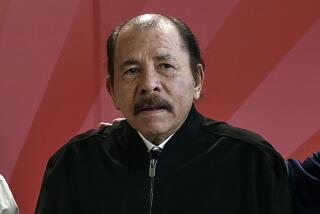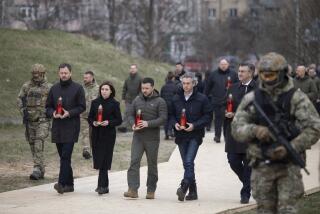U.S., Serbs Trade ‘Fascist’ Charges as U.N. Panel Meets : Human rights: The commission opens a session on reported atrocities in Bosnia. It may vote to investigate abuses.
- Share via
GENEVA — The United Nations Human Rights Commission on Thursday opened a two-day emergency session to investigate atrocity reports in Bosnia-Herzegovina, with U.S. and Serbian envoys trading accusations of “fascist” behavior by their respective countries.
Assistant Secretary of State John R. Bolton, terming the Serbian regime in Belgrade “the last fascist state in Europe,” predicted that a Bush Administration proposal for a probe into human rights abuses in Bosnia will be approved by the commission today. Infuriated Serbian Ambassador Branko Brankovic reacted by calling for the rights commission to “label the United States as a fascist country for what it did in Vietnam.”
“In this resolution we will be discussing,” said Brankovic, “you have something that is contrary to basic Roman law--that someone is innocent until proven guilty.”
The meeting in the U.N. Palais des Nations here opened with several hours of procedural debate among the delegates, some of whom wanted to specifically name Serbia and Montenegro as the aggressors in the fighting that has claimed thousands of lives and left an estimated 2 million people homeless. The American-written draft proposal does not designate any nationality as being at fault in the conflict.
Bosnian Vice President Ejup Ganic, speaking at the emergency session, presented a gruesome picture of conditions in his country.
“People are decapitated and men are castrated,” Ganic announced solemnly. “Women are raped and mutilated. Serbian symbols are carved on their bodies. Mass executions are routine. There are hundreds of mass graves.”
Such blood-drenched rhetoric is common on all sides of the war raging in the region. However, some of Ganic’s strident claims were backed up Thursday by an unusually critical report from the Geneva-based International Committee of the Red Cross, the organization charged in the Geneva Conventions with inspecting refugee and prisoner-of-war camps.
Normally apolitical and extremely careful to avoid making partisan judgments, the Red Cross, without naming Serbia, described what it termed “a policy of forced population transfers carried out on a massive scale and marked by the systematic use of brutality.”
After touring several Serbian-run detention centers in Bosnia, the Red Cross representatives said they had “access to only a very limited number of prisoners of war, while the places of detention are crowded with innocent and terrified civilians.”
Bolton said he had been assured of the support of at least 27 members of the 53-member Human Rights Commission for a U.S.-sponsored proposal to send a special human rights investigator to Bosnia, one of the former Yugoslav republics. By appealing to the Human Rights Commission, a former Cold War propaganda battleground, the Bush government opened another front in its diplomatic battle with the Belgrade regime that governs Serbia and Montenegro, all that is left of the Yugoslav federation.
According to diplomatic sources, two leading candidates for the human rights job are former Costa Rican President Oscar Arias Sanchez and Irish Foreign Minister Gerry Collins. U.S. and British officials are hoping to dispatch an investigative team to Bosnia and have it return with a report before a scheduled Aug. 26-28 London conference on the Balkans crisis.
Bolton, who is assistant secretary of state for international organizations, enraged the Serbian delegation at the meeting with a tough speech warning that Serbia and Montenegro were in danger of becoming “an international pariah, an outlaw state.”
“We ask the people of Serbia-Montenegro this simple question: Do they wish to go down in history as citizens of the last fascist state in Europe?” Bolton said.
Serbs and Montenegrins are fiercely proud of their anti-fascist guerrilla combat on the side of the Americans during World War II. “There is nothing that more emotional to a Serb than to be called a fascist,” said Serbian delegate Olga Spasik. “It’s like waving a red flag in front of our face.”
Later in the meeting, Bolton held up a Time magazine cover depicting a Bosnian Muslim in a Serbian detention camp and showed it to the Serbian delegation.
“A picture is worth a thousand words,” Bolton said.
More to Read
Sign up for Essential California
The most important California stories and recommendations in your inbox every morning.
You may occasionally receive promotional content from the Los Angeles Times.













